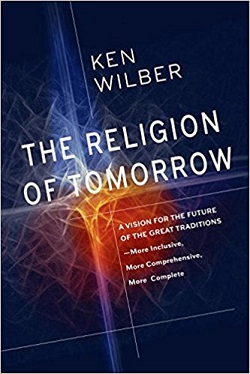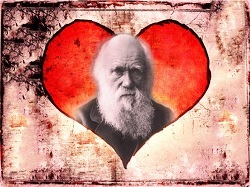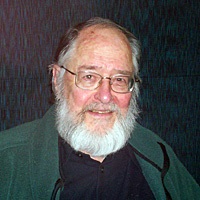|
TRANSLATE THIS ARTICLE
Integral World: Exploring Theories of Everything
An independent forum for a critical discussion of the integral philosophy of Ken Wilber
  Frank Visser, graduated as a psychologist of culture and religion, founded IntegralWorld in 1997. He worked as production manager for various publishing houses and as service manager for various internet companies and lives in Amsterdam. Books: Ken Wilber: Thought as Passion (SUNY, 2003), and The Corona Conspiracy: Combatting Disinformation about the Coronavirus (Kindle, 2020). Frank Visser, graduated as a psychologist of culture and religion, founded IntegralWorld in 1997. He worked as production manager for various publishing houses and as service manager for various internet companies and lives in Amsterdam. Books: Ken Wilber: Thought as Passion (SUNY, 2003), and The Corona Conspiracy: Combatting Disinformation about the Coronavirus (Kindle, 2020). 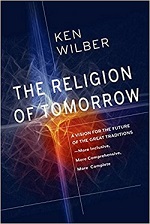 Frank Visser, CLIMBING THE STAIRWAY TO HEAVEN
Frank Visser, CLIMBING THE STAIRWAY TO HEAVENA 7-Part Review of Ken Wilber's The Religion of Tomorrow (2017) Part I: The Involution/Evolution Cosmology Part II: From Atom to Atman Part III: A More Adequate Spectrum of Colors? Part IV: What Is It Like to Be a Super-Nova? Part V: Rational Reasons to Believe in Spirit? Part VI: Is Darwin Really 'On Our Side'? Part VII: Climbing the Stairway to Heaven THE WHOLE SERIES: FREE DOWNLOAD AS PDF Review of "The Religion of Tomorrow", Part VI
IS DARWIN REALLY
|
| "OLD VIEW OF EVOLUTION" | "NEW VIEW OF EVOLUTION" |
|---|---|
| Evolution is a random, strictly biological process, with no overall progress, purpose or direction, in a materialistic, accidental and meaningless universe. | Evolution is a wider, universal process of emergence, showing overall progress, purpose and direction, in a spiritual, meaningful and wonderful universe. |
Loye puts it even stronger in the audio. "The old Darwinian thing was used by robber barons to justify their depredations. It was used by Hitler in his conquest. It was used by Stalin to push forward the idea of, you know, survival of the fittest."
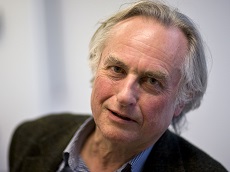
Richard Dawkins: "I should perhaps
have gone for The Immortal Gene."
It is at such a point that I get wary of these facile dichotomies, so popular in the alternative culture. We have on the one hand "the pseudo-Darwinian celebration of selfishness", which destroys everything that is valuable in society when taken to its logical consequences, and we have an uplifting view of love and unselfishness, which has to be introduced into our culture "before it is too late". The "negative" interpretation of Darwin prevails and leads to disaster. To save the world we need the "positive" interpretation of Darwin, stressing cooperation, mutuality, love and morality.
What I find particularly troublesome in Loye's discourse is his simplistic equation of neo-Darwinism with "survival of the fittest", selfishness and the ills of society. This betrays a superficial reading of even neo-Darwinism's most popular writer Richard Dawkins—a "Super Neo" Loye calls him. (Dawkins has even been held responsible for the rise of Tatcherism in the UK). Similar lines of reasoning equate atheism with immorality, nihilism and the end of the world as we know it. Most creationist objections to evolutionary theory don't hang on scientific details, but on its supposed detrimental moral effects. But if it is in the end all really a matter of "selfish gene/survival of the fittest mindset" vs. "love rules the world/Kosmos" this would mean the end of all mature and informed debate.
I'd like to highlight three points of contention, to start off this debate.
Survival of the Fittest?
For starters, isn't it entry-level understanding of evolutionary theory that "fittest" in "survival of the fittest" (not Darwin's term, but Spencer's) does not mean strongest, or most selfish, or aggressive, but "most adapted to the demands of the environment"? Here's a sample of a popular online source:
A majority of the general public may be able to describe natural selection as "survival of the fittest". When pressed for a further explanation of that term, however, the majority will answer incorrectly. To a person not familiar with what natural selection really is, "fittest" means the best physical specimen of the species and only those in the best shape and best health will survive in nature. This is not always the case. The individuals that survive are not always the strongest, fastest, or smartest. Therefore, "survival of the fittest" may not be the best way to describe what natural selection really is as it applies to evolution. Darwin did not mean it in these terms when he used it in his book after Herbert [Spencer] first published the phrase. Darwin meant "fittest" to mean the one best suited for the immediate environment. This is the basis of the idea of natural selection. (evolution.about.com)
There's even a quote attributed to Darwin which expresses this beautifully—even if it's authenticity is debated, it captures the spirit of his vision:
"It is not the strongest or the most intelligent who will survive but those who can best manage change." (www.goodreads.com)
So yes, physical strength can be selected for, but so can speed, or color, or agility, or flexibility—or yes, even human intelligence. This changes everything. Sometimes it helps to be big, but in different circumstances it helps to be small. It all depends. Competition and cooperation both exist in nature. Both can be included in a Darwinian perspective. If talent for competition works, it is passed on. If cooperation works, it is passed on too. Ironically, a talent for cooperation is even competitive! One only has to look at the soccer competition, where the team that shows the best teamwork wins from the competition.
As paleontologist Stephen Jay Gould phrased it well, in an essay about Kropotkin, a Russian biologist and activist who emphasized cooperation:
This charge against Darwin [that Darwinism undermines morality] is unfair for two reasons. First, nature (no matter how cruel in human terms) provides no basis for our moral values. (Evolution might, at most, help to explain why we have moral feelings, but nature can never decide for us whether any particular action is right or wrong.) Second, Darwin's "struggle for existence" is an abstract metaphor, not an explicit statement about bloody battle. Reproductive success, the criterion of natural selection, works in many modes: Victory in battle may be one pathway, but cooperation, symbiosis, and mutual aid may also secure success in other times and contexts. ("Kropotkin Was No Crackpot", Natural History, 1997)
Selfish Gene, Selfish Organism?
—Richard Conniff
Secondly, linking the concept of the "selfish gene" to selfishness in general and it's consequences for society overlooks the fact (made clear by Dawkins on numerous occasions but especially in the 30 year jubilee edition of The Selfish Gene, 2006, p. viii[6]) that Dawkins intended the emphasis in that infamous book title to be laid on gene, not on selfish. The larger theoretical discussion is about which biological level is "selfish"—gene, organism, group, species, ecosystem?—in the metaphorical sense of being selected and passed on to future generations. This is lost on the general public, spoon-fed on journalism, which as Dawkins wittily remarks only reads a book by its title [apparently half the title, FV], and not "the long footnote that is the book itself".
It goes without saying that genes can't be selfish, because they don't have feelings in the first place. This most obvious thing still needs stressing, even decades after the book's first publication. This metaphor was rejected at first by Dawkins' publisher, for being too "negative", though alternative titles such as The Immortal Gene were considered as well. (As an aside, would we all have become immortal had this title been chosen, instead of selfish?) Dawkins has many interesting things to say about metaphors and "good poetry", which leads to further research, and "bad poetry", which hinders it.
So Dawkins never claimed that we are inherently selfish because our genes are selfish. On the contrary! For assigning "selfishness" to the gene level—even if only in a strictly metaphorical sense—opened the possibility to have these genes create an organism that displays all kinds of behavior, from extreme selfishness to extreme altruism and everything in between. In the chapter "The Selfish Cooperator" in Unweaving the Rainbow (1998) Dawkins opposes both the notion that humans are essentially selfish and that they are essentially good-natured (as Frans de Waal has argued). Not surprisingly, we are both! And both traits have genetic components which can therefore be transmitted to subsequent generations. The easy logical step from selfish genes to selfish organisms is a non sequitur.
And yes, Darwinism has been misinterpreted often to imply that selfishness is our natural state, and therefore should rule the world, but the first statement is definitely wrong and the second one doesn't follow from the first. (Is natural always right?). But does the existence of false money disprove the existence of real money? Former Enron CEO Jeff Skilling's favorite book was The Selfish Gene, which left Dawkins "mortified" when he read about this in The Guardian (The God Delusion, Chapter 6: The Roots of Morality, p. 215n.) This grave misunderstanding gets corrected in the same footnote, by referring to the article "Animal Instincts" written by journalist and animal science writer Richard Conniff, who writes perceptively and concisely:
Genes may be selfish. But people have evolved to be social. And these days, the Darwinian view includes an understanding that cooperation and even altruism are part of our genetic heritage. (The Guardian, 27 May 2006)
So who's to blame for this misunderstanding? It is Dawkins here, for sure, who gets misunderstood and misrepresented, though the catchy book title hasn't exactly been helpful in removing this widespread misunderstanding.
A Divine Hand in Nature?
And thirdly, it might very well be true that the later Darwin wrote about phenomena that are specific to the human species. (Ironically, it was precisely the "Super Neo" Dawkins who suggested that we need the concept of memes to account for cultural phenomena. And no, this was not a later addition to his otherwise "reductionistic" works, but already occurs in chapter 11 of The Selfish Gene published in 1978!) Many contemporaries of Darwin, most notably the co-author of the theory of natural selection Alfred Wallace himself, thought that natural selection could perhaps explain the manifold phenomena of pre-human evolution, but that the human species was something entirely different, requiring a metaphysical explanation (Wallace became a spiritualist in his later years).
So Darwin's whole intent and purpose of writing The Descent of Man was to argue for a fully naturalistic explanation of the human species.[7] There was no Divine Plan, no Special Creation, no Hand of God infusing the great apes with intelligence. This was "Darwin's Dangerous Idea" in a nutshell, as Dennett's book by the same title has it. Has Daniel Dennett "distorted" Darwin, as Loye claims in the audio? What is this "dangerous idea"? That evolution is thinkable and explainable without postulating purpose, design, a Divine Plan etc. Now that was a vision that would meet with strong resistance in the nineteenth century (and in the US even in this 21st century)! Not the opposite view, that human beings have some special status over nature, for that was and is a common understanding. Tempting as it is to see things in nature as "designed" (by a "Designer" or Eros), a naturalistic explanation is possible that does away with that hypothesis (a temptation Ken Wilber has not been able to withstand).
As I wrote a few years ago in my paper on Wilber's misreading of evolutionary theory:
In spiritualist accounts, the scientific theory of evolution is often presented in a rather gloomy, not to say appalling fashion: according to the scientific worldview, we live in a meaningless and purposeless universe and are the products of random chance. Then, at the very moment you are about to kill yourself, the spiritualists present a much more appealing view of evolution: we are part of a universal process which is not only heading for Spirit, but driven by It as well. It's all "onwards and upwards" in this view of life. Who in his right mind would not vote for the second option?
We might well heed Richard Dawkins' admonition here, that in science, what counts is not that an idea is comforting, but that it is true... In the final analysis these emotional judgments don't count. (And for some, of course, science is appealing and spirituality appalling...)
In my opinion, facile dichotomies of aggression vs. love—often a variation of male vs. female, Loye is involved with the Center for Partnership Studies with his wife, the author Rianne Eisler) don't help our understanding of the processes of evolution. Framing neo-Darwinism as producing and being responsible for a grim prospect of our society, and contrasting it to a world of love an harmony that should save the world comes across as well-meaning but hopelessly New Age.
I must admit that I haven't read any of Loye's many self-published works on Darwin, but this online dialogue with Ken Wilber supposedly being a good summary of it ("You have done a brilliant job of summarizing all five books I've written!") is not promising. I am actually surprised that someone as erudite as Loye would engage in superficial treatments of neo-Darwinism like this.[8]
Talking about misinterpreting Darwin!
NOTES
[1] Frank Visser, The 'Spirit of Evolution' Reconsidered: Relating Ken Wilber's View of Spiritual Evolution to the Current Evolution Debates, August 2010, www.integralworld.net
[2] For example: the website "The Third Way: Evolution in the Era of Genomics and Epigenomics" provides enough critical evaluations of standard neo-Darwinism, by a group of biologists who try to find a middle way between Creationism and Neo-Darwinism. How many of these theorists would subscribe to Wilber's notion of an "Eros in the Kosmos"? And has he even tried to convince them of its validity?
[3] The book The Integral Darwin can be read online on Loye's website here: http://www.davidloye.com/darwin/.
[4] David Loye, "Darwin and Wilber", February 2009, www.integralworld.net
[5] Frank Visser, "Duplicating Darwin: Ken Wilber's and David Loye's Misreading of Neo-Darwinism", February 2015, www.integralworld.net
[6] Richard Dawkins' reflections on how the title The Selfish Gene has been misunderstood by many (to the extent that, according to the correct interpretation of this concept, genes are, of course, not selfish, nor are we born selfish), makes for interesting reading about how metaphors can go a long way. He even pleads guilty of occasionally having contributed to this misunderstanding:
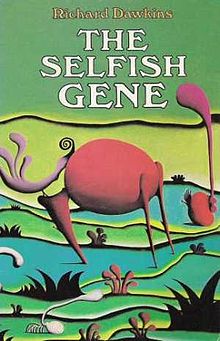
Original cover, with details from the
painting The Expectant Valley
by zoologist Desmond Morris
"Let me begin with some second thoughts about the title. In 1975, through the mediation of my friend Desmond Morris I showed the partially completed book to Tom Maschler, doyen of London publishers, and we discussed it in his room at Jonathan Cape. He liked the book but not the title. 'Selfish', he said, was a 'down word'. Why not call it The Immortal Gene? Immortal was an 'up' word, the immortality of genetic information was a central theme of the book, and 'immortal gene' had almost the same intriguing ring as 'selfish gene' (neither of us, I think, noticed the resonance with Oscar Wilde's The Selfish Giant). I now think Maschler may have been right. Many critics, especially vociferous ones learned in philosophy as I have discovered, prefer to read a book by title only. No doubt this works well enough for The Tale of Benjamin Bunny or The Decline and Fall of the Roman Empire, but I can readily see that 'The Selfish Gene' on its own, without the large footnote of the book itself, might give an inadequate impression of its contents. Nowadays, an American publisher would in any case have insisted on a subtitle.
The best way to explain the title is by locating the emphasis. Emphasize 'selfish' and you will think the book is about selfishness, whereas, if anything, it devotes more attention to altruism. The correct word of the title to stress is 'gene' and let me explain why. A central debate within Darwinism concerns the unit that is actually selected: what kind of entity is it that survives, or does not survive, as a consequence of natural selection. That unit will become, more or less by definition, 'selfish'. Altruism might well be favoured at other levels. Does natural selection choose between species? If so, we might expect individual organisms to behave altruistically 'for the good of the species'. They might limit their birth rates to avoid overpopulation, or restrain their hunting behaviour to conserve the species' future stocks of prey. It was such widely disseminated misunderstandings of Darwinism that originally provoked me to write the book.
Or does natural selection, as I urge instead here, choose between genes? In this case, we should not be surprised to find individual organisms behaving altruistically 'for the good of the genes', for example by feeding and protecting kin who are likely to share copies of the same genes. Such kin altruism is only one way in which gene selfishness can translate itself into individual altruism. This book explains how it works, together with reciprocation, Darwinian theory's other main generator of altruism. If I were ever to rewrite the book, as a late convert to the Zahavi/Grafen 'handicap principle' (see pages 309-313) I should also give some space to Amotz Zahavi's idea that altruistic donation might be a 'Potlatch' style of dominance signal: see how superior to you I am, I can afford to make a donation to you!
Let me repeat and expand the rationale for the word 'selfish' in the title. The critical question is which level in the hierarchy of life will turn out to be the inevitably 'selfish' level, at which natural selection acts? The Selfish Species? The Selfish Group? The Selfish Organism? The Selfish Ecosystem? Most of these could be argued, and most have been uncritically assumed by one or another author, but all of them are wrong. Given that the Darwinian message is going to be pithily encapsulated as The Selfish Something, that something turns out to be the gene, for cogent reasons which this book argues. Whether or not you end up buying the argument itself, that is the explanation for the title. I hope that takes care of the more serious misunderstandings.
Nevertheless, I do with hindsight notice lapses of my own on the very same subject. These are to be found especially in Chapter 1, epitomised by the sentence 'Let us try to teach generosity and altruism because we are born selfish'. There is nothing wrong with teaching generosity and altruism, but 'born selfish' is misleading. In partial explanation, it was not until 1978 that I began to think clearly about the distinction between 'vehicles' (usually organisms) and the 'replicators' that ride inside them (in practice genes : the whole matter is explained in Chapter 13, which was added in the Second Edition). Please mentally delete that rogue sentence and others like it, and substitute something along the lines of this paragraph. Given the dangers of that style of error, I can readily see how the title could be misunderstood, and this is one reason why I should perhaps have gone for The Immortal Gene." (The Selfish Gene: 30th Anniversary Edition, 2006)
[7] See: David Lane & Andrea Diem-Lane, Darwin's Moral Sense, The Evolution of a Conscience, www.integralworld.net.
[8] In his recently released Science in the Soul: Selected Writings of a Passionate Rationalist (2017) Richard Dawkins knocks down Wilberian-type of explanations for adaptive complexity (closely following a typology of six possible evolutionary theories devised by Ernst Mayr in his massive The Growth of Biological Thought: Diversity, Evolution and Inheritance, 1982, p. 360). From the 1982 lecture "Universal Darwinism":
Theory 1: Built-in capacity for, or drive towards, increasing perfection
To the modern mind this is not really a theory at all, and I shall not bother to discuss it. It is obviously mystical, and does not explain anything that it doesn't assume to start with. (p. 124)
"David Loye's is one of the few voices so desperately needed in the Darwin debates. Not only does he introduce "Eros" into the picture in a rational, sane, and supportable fashion, he makes the whole evolutionary theory hang together as "Eros-in-action," or, if you want, "Spirit-in-action" or "Love-in-action." It's been clear for quite some time now that the standard neoDarwinian synthesis can in no way account for the rise from dirt to Shakespeare, and new, believable theories are desperately needed. David Loye's is such a theory. The orthodox will cringe, and go on failing to explain evolution while bad-mouthing all other attempts, the Creative Intelligence folks will correctly spot all the missing holes in Darwinian theory and then-in an entirely unsupported move-fill in those holes by plugging them with Jahweh, a ridiculous move if ever there was one. The holes are supported by the data, Jahweh is not. David Loye's is both spotting the holes, then filling them with something like a self-organization principle, which is a drive to higher levels of organization warranted by the data itself. Call that extra push "self-organization," or "Eros," or "Spirit," or "Love," or what you will, but it is fully justified by empirical data and scientific research. I know of no one doing this as thoroughly and carefully as David Loye. Read him, it's one of the most important topics alive today." — Ken Wilber
